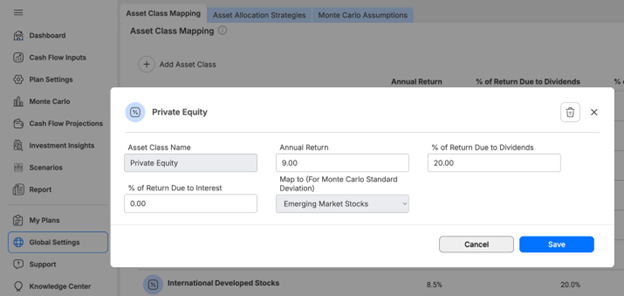Key Points:
- Trump’s executive order could allow retirement savers to invest in private equity, real estate, and even digital assets like Bitcoin.
- Historically, private equity and private credit have earned about 2% more per year than traditional public market investments.
- To protect retirement savers, the Labor Department may require limits on how much can go into alternatives, ensure liquidity, and confirm higher returns justify higher fees.

Your retirement savings might soon have access to new investment opportunities. President Trump recently signed an executive order that could open the door for 401(k) and other workplace retirement plans to invest in alternative assets; things like private equity, real estate, and even digital assets such as Bitcoin.
If implemented, this change could give retirement savers a chance to earn higher returns compared to what’s available in traditional stock-and-bond portfolios.
Fact Box
- • Unicorn Companies:
A unicorn company is a privately held startup valued at $1 billion or more. The term was coined in 2013 by venture capitalist Aileen Lee to highlight how rare these companies used to be, like finding a unicorn. Example: SpaceX, OpenAI, Shein and Epic Games (creator of Fortnite).
- • Private Equity:
Investment funds that buy and manage private companies (or take public companies private) with the goal of improving their value and later selling them for a profit. Example: Blackstone buying Hilton Hotels, improving operations, and later taking it public again.
- • Private Credit Funds:
Investment vehicles that lend money directly to private companies instead of buying ownership stakes. Example: A private credit fund might provide financing for a mid-sized manufacturer that can’t easily raise money through public bond markets.
- • Bitcoin:
Bitcoin is a digital currency (cryptocurrency) that operates without banks or governments. Instead, it runs on a technology called blockchain, a public, decentralized ledger that records all transactions. Example: If you buy Bitcoin, you own digital tokens stored in a secure digital wallet instead of a bank account.
- • Defined-benefit pension:
A retirement plan that guarantees workers a specific payout in retirement, usually based on factors like salary history and years of service. Example: A worker might be promised 60% of their average salary in retirement, paid out annually, regardless of how the stock market performs.
Why This Matters for Retirement Savers
Right now, 401(k) plans stick almost entirely to public markets - stocks and bonds of companies listed on major exchanges. These investments are familiar, liquid, and relatively easy to regulate.
But here’s the problem: the number of publicly traded companies has been shrinking. Back in 1996, there were around 8,000 public companies. Today, that number has dropped by half. At the same time, the private market has exploded.
Private companies backed by private equity grew from about 2,000 to more than 11,500 in the past two decades. Private equity and private credit funds have ballooned from roughly $3 trillion in assets to over $8 trillion in just ten years.
Over 700 “unicorn” companies now exist, including giants like SpaceX and OpenAI. Many of the fastest-growing, most innovative businesses are staying private longer, meaning everyday retirement savers can’t invest in them through their 401(k)s.
The Missed Opportunity
Private equity and private credit funds have historically outperformed traditional public market investments. Private equity buyout funds have beaten public stock returns by an average of about 2% per year over the last 30 years, even after fees.
Private credit funds have consistently earned at least 2% more than public debt markets over the past decade.
Meanwhile, defined-benefit pensions often invest heavily in private markets. Over 30 years, these pension funds have outperformed 401(k) plans by nearly 30%, thanks in large part to their access to alternatives.
But most Americans don’t have a pension anymore, only about 31 million still do. That leaves the majority relying on 401(k)s, which currently have little to no exposure to private markets.
Modeling Private Equity in WealthTrace

You can model the impact of incorporating alternative investments into your 401(k) accounts within WealthTrace. To do this, create a custom asset class named Private Equity. You can assign it a higher default return, in this example 9%. You can then connect it to an existing asset class for Monte Carlo purposes that has higher volatility since we would expect these investments to be more volatile.
You can apply this asset class to existing investments or add new ones to run scenario analyses. This allows you to evaluate the potential benefits of higher returns while also understanding the increased risk associated with alternative investments.
Why Aren’t Alternatives Already in 401(k)s?
The biggest roadblock has been legal risk. Employers who sponsor 401(k) plans are fiduciaries, meaning they must act in the best interest of participants. When companies have tried adding private equity options to their retirement plans, lawsuits followed. Even when the courts sided with employers, the costs and risks were enough to scare most companies away.
What Trump’s Order Proposes
Trump’s executive order directs the Labor Department to consider creating a regulatory safe harbor. This would protect 401(k) sponsors from lawsuits as long as they follow clear best practices, such as:
Making sure alternative investments don’t take up more than one-third of a portfolio option.Ensuring there’s enough liquidity (so participants can still move their money when needed).Confirming that expected returns justify the higher fees typically associated with alternatives. The SEC is also exploring ways to expand access to private markets through registered funds that could be traded on exchanges. These funds would provide more liquidity and transparency, giving individual investors safer access to alternatives.
The Bottom Line
If the Labor Department follows through on this order, 401(k) investors could finally gain exposure to some of the fastest-growing areas of the market.
It doesn’t mean every saver should rush into private equity or crypto, but it would give Americans more choices and potentially higher returns. With trillions of retirement dollars at stake, even small improvements in performance could make a huge difference over time.
Private markets are no longer just for institutions and ultra-wealthy investors. With the right safeguards in place, everyday workers might soon have the chance to share in those gains too.
Do you want to see how private equity investments will impact your retirement? Sign up for a free trial of WealthTrace to find out and to build your retirement plan today.